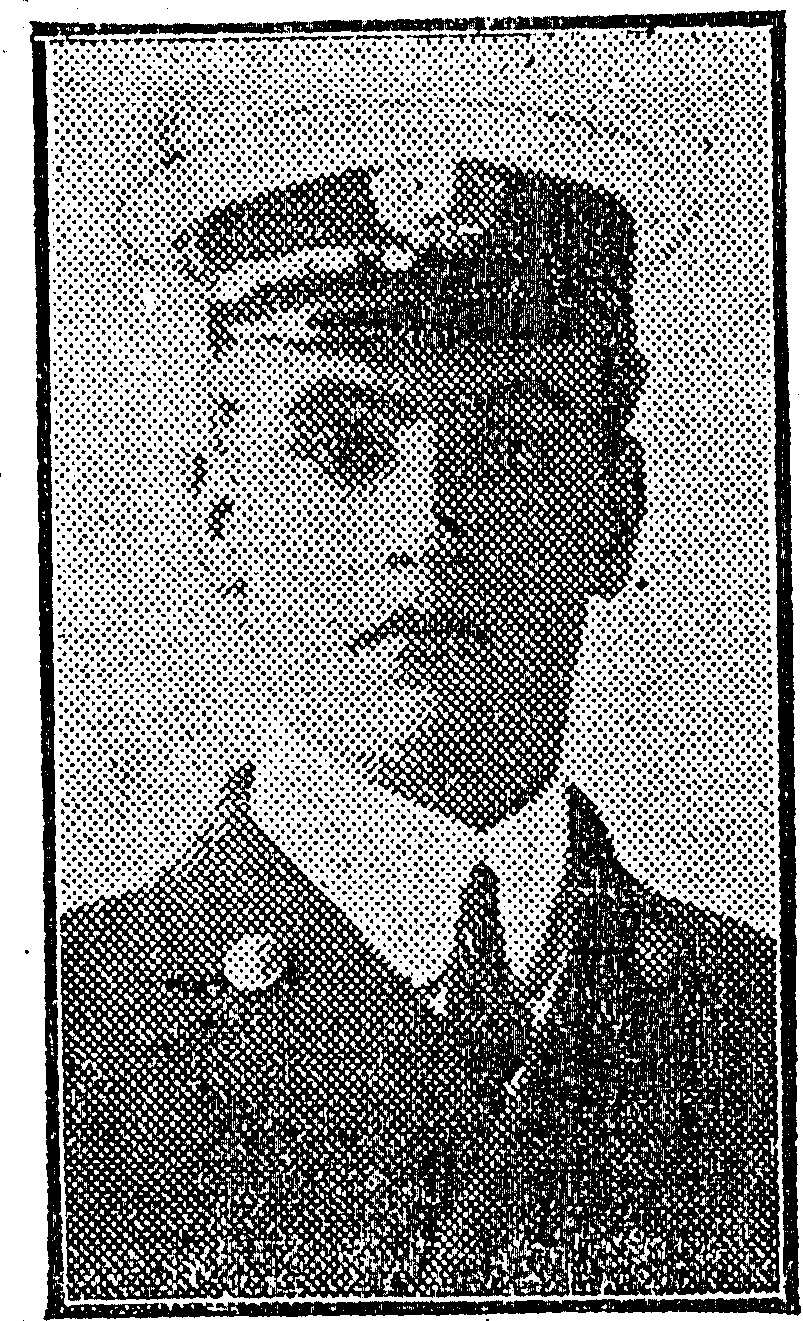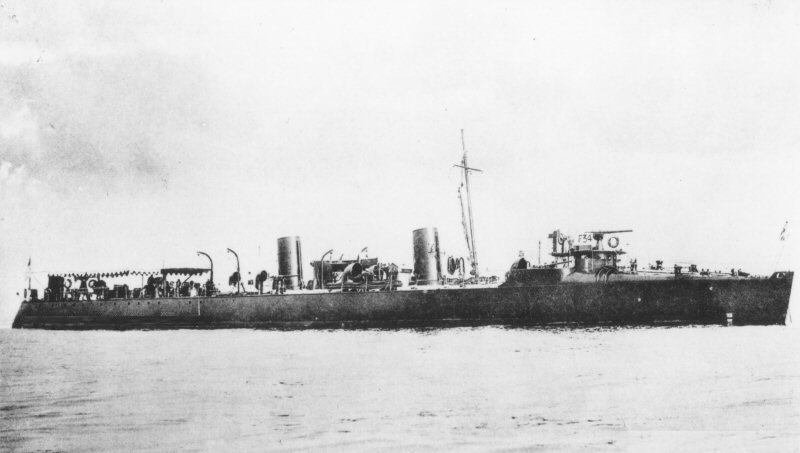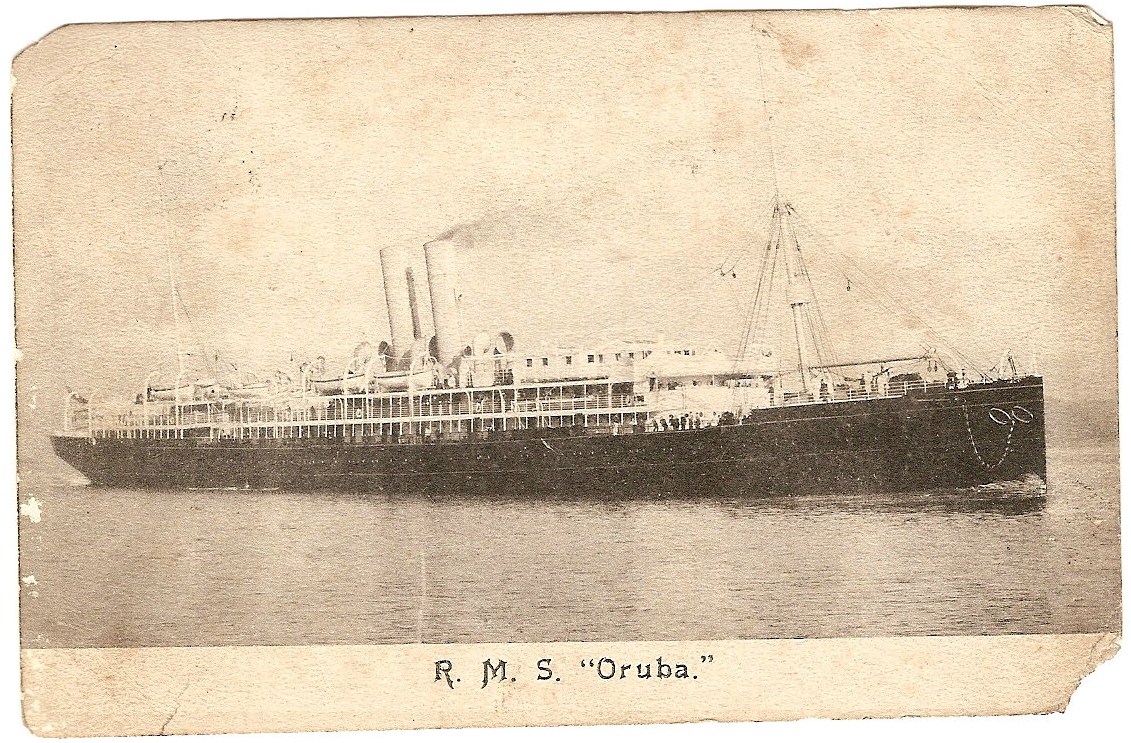 Military unit: Royal Naval Reserve
Military unit: Royal Naval Reserve
Date & place of birth: 21 May 1882 at Lyttelton, New Zealand
Date & place of death: 28 April 1916, aged 33 at Portsmouth Corporation Mental Hospital, Hampshire
Prior to the war, Gerald Macey was master mariner with the Royal Mail Steam Packet Company. During the war, he served with the Royal Naval Reserve, but suffered a nervous breakdown and died in a mental hospital.
Family
Gerald Charles Macey was born in Lyttelton, near Christchurch, on the South Island of New Zealand on 21 May 1882. He was the youngest surviving child of Charles John Macey (1814–1896) and his second wife Emily Louisa née Collender (1843–1934).
Charles John Macey was born in East Meon, Hampshire and on 30 November 1846, aged 32, he married 24-year old Maria Ann Collender at St. Botolph’s Church in Aldgate, London. The couple’s first son, named after his father, was born on 1 July 1847, but sadly died, aged 4 shortly after the birth of their second son, Sidney William, in 1851. The couple had a further three sons, one of whom died as an infant, before Maria died, aged 40 in 1862, leaving Charles with three sons under 12.
On 15 October 1863, Charles (now 49) married Maria’s 20-year old sister, Emily Louisa Collender, at the church of St John of Jerusalem in South Hackney, London. Their first child, Emily Constance, was born the following year, followed by a further nine children (one daughter and eight sons) over the next 20 years, although at least three died as infants.
Charles Macey was a master mariner by profession and earned his Certificate as a Master on 24 September 1851, aged 37. He quickly rose to the top of his profession, taking command of tea clippers between China and England and during the Indian Mutiny of 1857, he commanded a troop ship.
In May 1868, described as “formerly Captain and Owner of the ship Monarch of London”, he was declared bankrupt although he was discharged in February 1870. He explained to the Court of Bankruptcy that his inability to settle his debts (£5,205) arose following a mutiny onboard SS Monarch on a voyage to Auckland, New Zealand, when the cargo was plundered. In his attempts to prosecute the crew, he incurred debts which forced the sale of the Monarch by the mortgagees.
At the time of the 1871 census, Emily (described as the wife of a “Captain in the Merchant Service”) was living at Clarence Road, Highgate with her three sons, (Ernest, aged 5, Leopold, aged 3, and Bertram, aged 5 months) her daughter, Emily, aged 7, her youngest step-son, Norman, aged 10, and an 18-year old maidservant.
Shortly after this, the family moved to New Zealand where Emily’s fourth son, Walter, was born in 1875, although he died the following year. The next son, Charles, born in 1876 also died before his first birthday, although his twin sister, Jessie lived until she was 94. The next son, William was born in June 1877, after which there was 5 year gap, before Gerald was born in May 1882. Charles and Emily’s tenth and last child, George was born in 1885 but died the following year.
After the family settled at Lyttleton, Charles continued to sail between New Zealand and Australia, before leaving the sea and working as a marine surveyor until he died on 19 January 1896, aged 82.
On 9 January 1890, Gerald, aged 7, was on the quayside at Lyttleton when he fell from a jetty into the sea, between the SS Rotorua and the wharf. He was saved by a fireman (variously reported as Emanuel Pote or Harry Wall) from HMS Opal who dived into the water to rescue him from drowning, until a rope was lowered to haul him out of the water.
After finishing his schooling at Christchurch, Gerald worked for the New Zealand and Australian Land Company on the Acton Estate at Rakaia, 40 miles west of Lyttleton. Described as “a warm favourite with all the employees, … his manner endeared him to all with whom he came into contact”. After several years on the Acton Estate, Gerald followed his elder brothers, Robert and Ernest, as a mariner.
In the early years of the 20th century, he arrived in England, where he obtained his certificate as First Mate of an Ocean-Going Vessel at Southampton on 25 May 1908. At the 1911 census, he was recorded at 1 Terminus Terrace, Southampton, the offices of The Royal Mail Steam Packet Company, when his occupation was given as “mariner”.
Masonic career
On 11 January 1912, Gerald Macey was initiated into Royal Gloucester Lodge No. 130 at Southampton. At this time, he was employed as the 4th Officer on the 5,971 ton Royal Mail steamship Oruba. He was passed to the second degree on 11 July, and raised to the degree of a Master Mason on 8 May 1913.
Service in the Merchant Navy and the Royal Naval Reserve
Gerald obtained his certificate as Master of a Foreign-Going Ship at Southampton on 10 May 1913. Between May 1913 and February 1914, he was serving on the Royal Mail SS Demerara sailing between Liverpool and South America, as 3rd Mate.
On 1 October 1913, while still employed by The Royal Mail Steam Packet Company, Gerald was commissioned into the Royal Navy Reserve as a (probationary) sub-lieutenant. The Royal Naval Reserve (RNR) had been created in 1859 as a reserve of professional seamen from the British Merchant Navy and fishing fleets, who would undertake annual training in gunnery etc. with the Royal Navy and be called out for service in the fleet in time of war.
From 25 June 1914, he was 2nd Mate on the Royal Mail SS Arcadia as it sailed around the UK from Grimsby to Liverpool, where it arrived on 1 August.
Gerald’s rank as a sub-lieutenant in the RNR, was confirmed on 21 December 1914, backdated to 1 October 1913.

Following the outbreak of World War One, on 11 August 1914, Gerald joined the HMS Victory training base at Portsmouth, from where he was posted as second-in-command of HMS Desperate on 15 October, taking the rank of acting Lieutenant on 26 November. HMS Desperate was a 340 ton torpedo-boat destroyer, built in 1896, now used for gunnery training at sea for HMS Excellent, the Portsmouth gunnery training school.
Death and commemoration
On 11 March 1915, Gerald Macey was admitted to Haslar Hospital at Gosport. His RNR service record gives the reasons for his admission as “neurasthenia (attempted suicide)”.
In May 1915, a letter from Charles to a friend in New Zealand was published in the Ellesmere Guardian.
You will perhaps be surprised to learn that I am down on my back with a nervous breakdown. During the past six months I have had a very strenuous time on the “Desperate”, and not being too fit at the time of the outbreak of war, it has told on me, and I have at last been forced to give in.
We were out in all weathers patrolling the channel and my position as first lieutenant on board the ship entailed long hours. I was generally on my feet for about sixteen to eighteen hours a day and, of course, it was too much. Last week I absolutely caved in while on patrol and had to be brought in with all speed to Portsmouth and here I am. I have a night and day nurse to look after me and the doctor and a specialist come to see me three times a day. However, l am on the mend, but will have to stay about three weeks in bed and then be on the convalescent list for a month, so it will be some time before I get back to duty. I have a fine cabin here overlooking the drive and park leading up to the entrance and I can take note of all people coming into the grounds, which helps to pass the time away. Many of my fellow officers from the other ships, when they come into port for a stand-off, come and have tea with me in the afternoon, so I am really not so lonely and it does cheer one up.
Isn’t this a terrible war? It had to come and I am glad to have been able to do my share up to the present. I have no sympathy with the Germans as they undoubtedly brought it on themselves, and will have to suffer in the end. They would have crushed us if they could and it is our duty as sons of Great Britain to retaliate and give them such a beating that they will cease to be a menace to the peace of the world for at least many years. I hear that they have only two raiding cruisers at large and their positions are known to the Admiralty, so it will not be long before they are run to the bottom. I don’t think their fleet will ever come out and challenge ours, for they have already had good occasion to recognise that we are far too superior in every way on the sea. The Germans are very bold when they have the upper hand, but, when the odds are equal they generally show the white feather. This has been proved on many occasions during the war.
The colonies are sending a great number of men to the colours and they are certainly fine fellows. I have several times seen them at the camps about Portsmouth and Southampton, as Southampton is the great centre for transports leaving for the continent. I must confess that I love the sea immensely and the travelling about in peace times and meeting different people is an education in itself. I would not settle down to life on land again for anything and only regret that I did not go to sea three years earlier than I did.
By the time this letter was published, Gerald had been placed on the retired list (with effect from 7 April 1915).
Despite the optimism displayed in his letter, his condition worsened and he was admitted to the Portsmouth Mental Hospital in Kingston, Portsmouth where he died on 28 April 1916. His death certificate records the cause of death as “Exhaustion from melancholia (3 months)”. At the time of his death, his home address was recorded as 40 Morris Road in The Polygon area of Southampton.
As at the time of his death, Gerald had been placed on the Retired List, he is not recognised by the Commonwealth War Graves Commission as a war casualty, although he was buried in Southampton Old Cemetery in Hill Lane. He is not commemorated on any UK war memorial although he is included on the Auckland (New Zealand) online Cenotaph.
Other family members and subsequent events.
Gerald’s half-brother, Robert Buxton Macey, was a mate onboard the ship Ngankin when he died at Wuhu, China on 21 July 1895, aged 42.
Ernest Charles Macey was killed in an explosion onboard the Royal Mail ship Thames at Montevideo in Uruguay on 11 March 1899, aged 33. When the Thames returned to Southampton, his fellow officers erected “a handsome monument to his memory” in the cemetery in Hill Lane.
Gerald’s sister, Jessie married Herbert Edward Whitehead in Southampton in 1915. He became a commander in the Royal Navy but was killed, aged 73, at home in Dafforne Road, Tooting by enemy bombing on 28 July 1941.
Gerald’s mother returned to England to live at Morris Road, Southampton, and later in Falkland Road in Regents Park. She died at Highgate, London on 29 January 1934, aged 90.
Sources
Ancestry.co.uk
1871 England Census
1911 England Census
Masters and Mates Certificates, 1850-1927
National Probate Calendar (Index of Wills and Administrations), 1858-1966
Navy Lists, 1888-1970
United Grand Lodge of England Freemason Membership Records, 1751–1921
Ashburton Guardian. 16 May 1900. Killed by an Explosion.
Birmingham Daily Post. 26 December 1914. Royal Naval Reserve.
The Broad Arrow, The Naval & Military Gazette. 30 April 1915. Royal Naval Reserve
Ellesmere Guardian. 22 May 1915. The Ceaseless Vigilance. Life for Men of Nerve and Iron Constitution.
The Evening News, Portsmouth. 19 April 1915. Retirement.
The Globe.
4 October 1913. Naval News.
19 April 1915. Royal Naval Reserve.
Hampshire Advertiser.
13 May 1916. Sub-Lieutenant Gerald Charles Macey R.N.R. Deceased.
30 December 1916. The Death Toll for 1916.
Hampshire Telegraph. 23 October 1914. Royal Naval Reserves.
Jenkins, Roger. Royal Gloucester Lodge 130 History (2017)
The London Gazette:
25 December 1914 Issue: 29019 Page: 11056
20 April 1915 Issue: 29136 Page: 3830
Lyttleton Times.
27 May 1899. Deaths.
21 July 1916. Deaths.
Masonic Roll of Honour: Lieutenant Gerald Charles Macey
The National Archives:
ADM 240/56/152: Gerald Charles Masey. Rank: Sub-Lieutenant. Date of Seniority: 01 October 1913
ADM 340/91/11: Macey, Gerald Charles Rank: Sub-Lieutenant
The Press, Christchurch.
10 January 1890. Rescue at Lyttleton.
20 January 1896. Obituary – Captain C.J. Macey.
19 June 1916. On Service. Personal Notes about New Zealanders.
24 June 1916. Obituaries.
The Scotsman. 20 April 1915. Royal Naval Reserve.
Shipping & Mercantile Gazette. 3 March 1870.
South Canterbury Times. 10 January 1890.
The Star, Canterbury. 20 January 1896. Captain Macey.
The Sun, Ellesmere. 26 March 1917 Ellesmere Notes.
Photograph credits
Portrait: The Star, Canterbury. 3 July 1916.
R.M.S. Oruba: Lost at sea: Tales my grandfather would have told me. A sailor’s life 1910-1941
HMS Desperate: battleships-cruisers.co.uk
